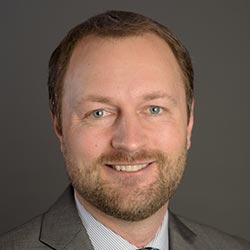Masanet Uses Sabbatical to Combat Climate Change
Masanet leads International Energy Agency’s Energy Demand Technology Unit
Climate change is one of the world’s biggest problems. Northwestern Engineering’s Eric Masanet is working to be part of the solution.
Last December, representatives from 195 countries converged at the United Nation’s Conference on Climate Change (COP21) in Paris. There, they reached a landmark agreement that is believed to be a historic turning point for combating climate change. Called the “Paris Agreement,” it is the most significant international deal to reduce global warming since the issue first emerged.
 The agreement’s arguably most ambitious goal is to limit the global temperature rise to well below 2 degrees Celsius. Masanet’s modeling team is crunching numbers to help governments explore ways of getting there.
The agreement’s arguably most ambitious goal is to limit the global temperature rise to well below 2 degrees Celsius. Masanet’s modeling team is crunching numbers to help governments explore ways of getting there.
Currently spending his sabbatical with the International Energy Agency (IEA) in Paris, Masanet also participated in several COP21 side events. He leads the IEA’s Energy Demand Technology Unit, which is addressing some of society’s most pressing challenges by identifying clean energy technology pathways and policies that can help limit global temperature rise.
“The Paris Agreement sets very ambitious goals,” said Masanet, Morris E. Fine Junior Professor in Materials and Manufacturing. “It will require major shifts in energy systems, behavior, and development pathways over the next two-to-three decades in all world regions.”
Masanet is no stranger to modeling complex systems. At Northwestern, he develops mathematical models that quantify opportunities for reducing society’s energy and resource use over different scales of time and space. Manufacturers, consumers, and policymakers use such models to identify technological, behavioral, and policy pathways toward more sustainable products and processes.
Although he has dedicated his life to sustainability, Masanet said his IEA experience has “redoubled” his passion for using models to guide effective technology and policy decisions.
“Having sound data on how transitions to more sustainable energy systems can meet multiple societal goals — and at what cost — is imperative for accelerating policy action, and this is where modeling can make a real difference,” Masanet said. “The world needs such analyses and numbers urgently, given the decisions and investments being made in many countries related to clean energy deployment and climate change mitigation.”
When he returns to Northwestern, Masanet plans to leverage the experience and knowledge he gained abroad in his laboratory’s modeling work. His time in Paris, he said, has given him a more global perspective on how different countries deal with climate challenges and solutions.
“The optimal mix of technologies and their rates of adoption in one country might look very different from those in another, depending on local factors, such as energy supplies, economic structure, and local resources,” Masanet said. “I’ve developed a greater appreciation of how local factors influence the shape of energy policy and for how such nuances must be reflected in analyses for technology guidance.”